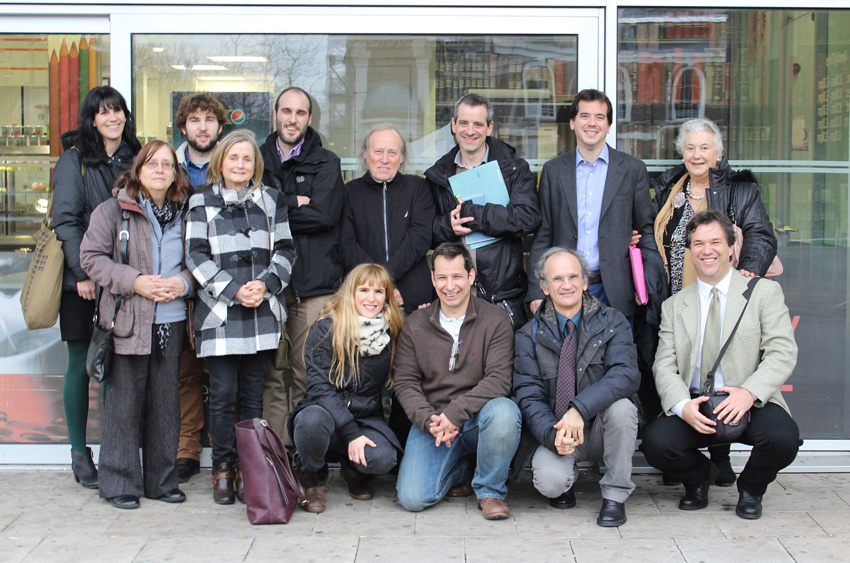
From Left to right: Aurora Madaula, Aritz Onaindia, Aritz Ipiña, Ane and Mirentxu Button Irujo (Manuel Irujo’s granddaughters), Ron Bates, Irati Agirreazkuenaga, Gorka Mercero, Mikel Irujo, Joseba Agirreazkuenaga, Xabier Irujo and Arantzazu Amezaga
The University of Liverpool, England, celebrated an international conference entitled “Manuel de Irujo and Basque Politics of the Twentieth Century,” on March 9. The conference, organized by Gorka Mercero (professor of the Basque Studies Program) and Xabier Irujo (co-director of the Center for Basque Studies in Reno), analyzed the ideology of Irujo: Christian-democracy, complete respect for human rights, republicanism and the construction of a Basque republic in the heart of a united Europe.
Liverpool, England. The conference celebrated on March 9 was sponsored by the Manuel Irujo Fellowship at the University of Liverpool, established by the Etxepare Basque Institute. Xabier Irujo, co-director of the Center for Basque Studies at the University of Nevada, Reno is the first invited professor of this program, and was one of the organizers of the event, along with Gorka Mercero, professor at the Basque Studies Program at the University of Liverpool.
The seminar analyzed the life of Manuel Irujo and his contribution to Basque Politics in the 20th century. It was attended by the dean of the College of Humanities at the University of Liverpool, Chris Harris. “This is a very important moment for Liverpool. Manuel Irujo de Ollo is an emblematic figure of social justice in Basque and Spanish History,” Harris said.
Presenters included: Aurora Madaula (University of Barcelona), Irati Agirreazkuenaga (London School of Economics), Aritz Ipiña and Aritz Onaindia (University of the Basque Country) and Aranzazu Amezaga, Irujo’s biographer. Amezaga was recently awarded the Sabino Arana Prize for her career, and introduced Irujo in a historical context.
For his part, Xabier Irujo (UNR) and Joseba Agirreazkuenaga (University of the Basque Country) served as moderators, closing the seminar with a round table on the two dictatorships that Irujo had to suffer that of Alfonso XIII and Franco, two wars and a long exile that ended with an incomplete transition. According to organizers, Irujo’s ideology continues to be his strongest legacy: Christian-democracy and complete respect for human rights, republicanism and the construction of a Basque republic in the heart of a united Europe.
Focus of Basque Studies in Europe
The University of Liverpool hopes to become the reference in the area of Basque studies in Europe and in the coming weeks it will be the site of various conferences and talks, made possible by the Manuel Irujo Fellowship supported by the Etxepare Basque Institute. The University includes Irujo’s personal library among its resources that was donated by his family and is available to researchers at the Sydney Jones Library.

[Manuel Irujo’s granddaughters at the Sydney Jones Library at the University of Liverpool with resources donated by his family (photoLiverpoolUniversity)]
According to Xabier Irujo, “the Manuel Irujo collection includes more than 400 books and pamphlets as well as 117 magazines on politics, language and Basque culture. The value of these publications as a research resource is exceptional, but its historic value is immense.”
“When the Spanish police came to the house of Grandpa Manuel Irujo to take him away, the police informant said ‘there is nothing valuable here, just books.’ And that is how the Irujo library has survived five wars and four dictators,” Irujo said. “The University of Liverpool has become the home of this historic heritage and has the potential to become the focus of Basque Studies in Europe.”







 Send to a friend
Send to a friend Add comment
Add comment








